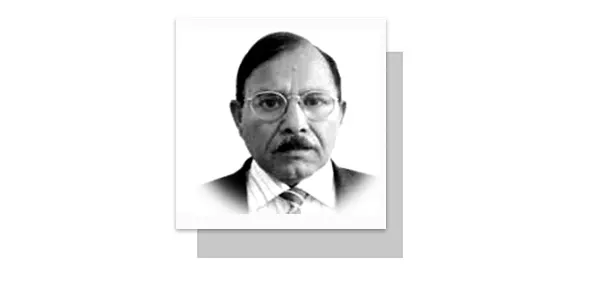THE kind of confrontation and polarization among the judges of the Supreme Court and Islamabad High Court and their actions reflecting trade unionism is a rare development in the judicial history of the country. Judges are neither supposed to publicly air their grievances or differences with other judges on legal or constitutional matters nor act as group to register their complaints with the Supreme Judicial Council or the Chief Justice of Pakistan. Such collective action is blatant violation of the code of conduct for judges issued by the Supreme Judicial Council.
Justice Mansoor Ali Shah’s group opposes the 26th Amendment and its enforcement, despite the constitution granting parliament absolute authority to amend provisions, with such amendments beyond judicial challenge. Their demand to halt judicial appointments until a verdict is issued is unjustified, as Article 239(5) and (6) are clear and need no interpretation. Courts intervene only when ambiguity exists. Judges, as constitutional custodians, must uphold the law impartially, without prioritizing personal preferences. Their role demands restraint and adherence to constitutional principles, ensuring that legal interpretations remain free from subjective influences and align strictly with constitutional mandates.
The letter written by six judges of the Islamabad High Court to the Supreme Judicial Council and Chief Justice of Pakistan regarding interference by the agencies was an ill-conceived move by them. If at all any judge really felt that he was facing pressure or interference from operative of any agency then instead of complaining it to the Supreme Judicial Council or the Chief Justice of Pakistan he himself should have started contempt proceedings against that individual. And if a judge does not have the heft to resist pressure or take to task any one interfering in his work then he does not deserve to be the judge of a high court of Supreme Court. By lodging the complaint they actually exposed their incompetence. Making the representation as a group was even a bigger folly as they were not supposed to indulge in trade unionism like activities that they actually did.
I am afraid that the five judges of IHC who have written a letter to Chief Justice of Pakistan and Chief Justices of IHC, Punjab and Sind with regard to transfer of judges to Islamabad High Court are also guilty of indulgence in trade unionism. As far as their opposition to transfer of judges from other High Courts to IHC is concerned, it lacks constitutional validity.
Article 200 of the constitution confers power on the President for such transfers after consultation with Chief Justice of Pakistan and Chief justices of the concerned High Courts. That process has been strictly followed. There are precedents in the past where judges have been transferred from one high court to the other. For instance, Justice Sardar Mohammad Aslam was transferred from the Lahore High Court to the Islamabad High Court in 2008 and subsequently became its Chief Justice. Similarly, Justice M. Bilal Khan and Justice Iqbal Hameed ur Rehman were also transferred under Article 200 and later appointed as Chief Justices of the Islamabad High Court. They did not take fresh oaths and also maintained their seniority from the date of their appointment in the high courts from where they were transferred. So there is no cause for them to oppose it.
Opponents of judicial transfers claim that a transferred judge must retake the oath and that seniority should reset upon assuming charge. They cite Article 194, which states that a Chief Justice takes an oath before the Governor, while other judges do so before the Chief Justice. However, this provision applies only to initial appointments, not transfers. The constitution does not mandate a fresh oath for transferred judges.
Past precedent supports this—transferred judges retained their original seniority without retaking the oath. For example, Justices Sardar Mohammad Aslam, M. Bilal Khan, and Iqbal Hameed ur Rehman were transferred under Article 200 without fresh oaths, maintaining their seniority. Therefore, opposition to these transfers is unfounded, misinterprets Article 194, and disregards established judicial practice. The process has been followed in accordance with constitutional provisions, making the objections both legally and historically baseless.
I have deliberately avoided political angularities being attributed to the moves by the judges and have strictly adhered to legal aspect of the issue. My advice to all the judges is that they should accept the ascendancy of the parliament and the constitution and refuse to be part of any move that undermines their pre-dominances.
“We, the undersigned justices of the Islamabad High Court are writing in view of widely reported news by the media that has since been addressed by multiple bar associations as well, that a justice from the Lahore High Court is to be transferred to the Islamabad High Court. This transferred judge would then be considered for appointment as the Chief Justice of the Islamabad High Court,” the IHC judges wrote.
The letter noted that the process of transfer from one high court to another is governed by Article 200 of the Constitution, which provides, under sub-clause (1), that “[1] The President may transfer a Judge of a High Court from one High Court to another High Court” but only “after consultation by the President with the Chief Justice of Pakistan and the Chief Justices of both High Courts.
—The writer is contributing columnist, based in Islamabad.
( ashpak10@gmail.com)


















